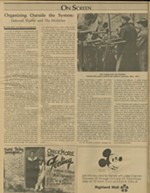Demagoguery Disguised as Documentary
What is the difference between Dinesh D'Souza and Michael Moore?
By Louis Black, 1:15PM, Tue. Jul. 8, 2014
The following was originally written as a 500-word introduction to my review of Dinesh D'Souza’s new movie America: Imagine the World Without Her. With no space to run my intro in the print issue, we excised it from the review and are running it as a stand-alone meditation on the state of documentary filmmaking.
Watching this seemingly mild-mannered but really vitriolic documentary I came to a fuller understanding and appreciation of conservatives' hostility toward documentary filmmaker Michael Moore. I've always felt a certain despair regarding liberals’ embrace of Moore because he is so blatantly manipulative and, at least, intellectually dishonest. It wasn't that I forgave him his trespasses, it's that, in general, I was sympathetic enough to his politics that, though I distrusted his films so much, tainted as they are by his heavy-handed cinema, I abided them.
A bit ashamed, I now deal with a certain hypocrisy on my part because, regardless of beliefs, Moore is much more a demagogue than documentarian. D'Souza’s excessively dishonest and petty proselytizing brought home how really reprehensible this type of filmmaking is. There is a responsibility to be even harsher on those with whom one agrees when they use cinematic tools to achieve a predetermined goal.
The term "documentary" has always been suspect, not just going back to Robert Flaherty staging scenes in 1922 for Nanook of the North, but actually the whole notion that this is a cinematic form for truth-telling. Even though the best documentaries (as with any considered media), try to fully present their subjects, the films remain constructs, which are the result of any number of conscious decisions – such as to what footage to include and what to leave out. Further, the language of cinema is not neutral but conveys opinions and information including the angles of shots, what is featured on the soundtrack, and the lighting of people. Even cinéma vérité that supposedly offers an unaltered slice of life, is actually processed through many decisions as to what ends up on the screen and how it is presented.
Currently, many if not most of what is passed off as documentaries are really cinematic essays that advocate rather than explore, polemicize rather than report.
The heart of this dilemma is articulated in Jean-Luc Godards La Chinoise (1967) in which a student facing the camera offers the following: "They say Lumière invented current events. He made documentaries. But there was also Méliès, who made fiction. He was a dreamer filming fantasies. I think just the opposite …” The argument is that overtly "fiction" films present an array of information about how they were made, what they are saying, the times that produced them, and the audiences for which they're intended. Documentary films, on the other hand, pretend to "truth" but are inherently manipulated by the stylistic and narrative decisions of filmmaking, and are always "fictions."
One can get far along in this argument as it applies to the most strenuously fair documentarians. But you don't even get past “go” when it comes to Moore and D'Souza, whose ambitions are no greater than to present a partisan argument in such a way as to anoint it as "truth. The idea is exactly the opposite of trying to arrive at some greater meaning, it narrows its focus to reinforce existing beliefs. Here I should probably offer some alternative name for these films, but I am at a loss. "Documentary," however, I know, is completely off-base.
A note to readers: Bold and uncensored, The Austin Chronicle has been Austin’s independent news source for over 40 years, expressing the community’s political and environmental concerns and supporting its active cultural scene. Now more than ever, we need your support to continue supplying Austin with independent, free press. If real news is important to you, please consider making a donation of $5, $10 or whatever you can afford, to help keep our journalism on stands.
Richard Whittaker, June 14, 2018
Richard Whittaker, Oct. 11, 2017
May 3, 2022
documentaries, America: Imagine the World Without Her, Dinesh D'Souza, Michael Moore











